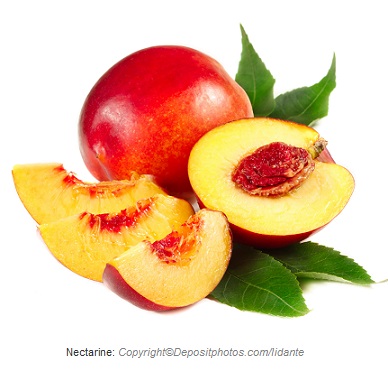Nectarine is a fruit from the same family as peach is. Sometimes it is difficult to  distinguish nectarines from peaches. Nectarines have smoother skins than peaches. A medium nectarine is about 140 grams and provides 15 grams of carbohydrates, 2 grams of protein and 2 grams of fiber.
distinguish nectarines from peaches. Nectarines have smoother skins than peaches. A medium nectarine is about 140 grams and provides 15 grams of carbohydrates, 2 grams of protein and 2 grams of fiber.
Average calories: 68 per one medium fruit.
|
Nectarine: one medium |
|
|
Carbohydrate |
15 |
|
Fiber |
2 |
|
Protein |
2 |
|
Fat |
0 |
|
Calories |
68 |
Vitamins found in higher amounts: vitamins C, A, B3, and K.
Minerals found in higher amounts: potassium, magnesium and copper.
Phytonutrients found in higher amounts and their health benefits: carotenoids, flavonols, anthocyanins, phenolic acids, and amygdalin are the phytonutrients found in nectarines.
Carotenoids have eye health-promoting, anti-oxidative and anti-cancer properties.
Rutin and quercetin are flavonols in nectarines. They improve cardiovascular health. For detailed information about rutin and quercetin, see “Rutin“ and “Quercetin” under the section of “Antioxidants“.
Anthocyanins are flavonoids that fight inflammation and improve blood circulation. Anthocyanins also strengthen the walls of the vessels, making them effective in varicose veins. They are potent scavengers of free radicals with capacities to reduce blood sugar, blood pressure, and bad cholesterol.
Chlorogenic acid, ellagic acid, gallic acid, catechin and epicatechin are the phenolic acids founds in nectarines. They possess anti-cancer, anti-inflammatory, and detoxifying effects.
Amygdalin is a unique phytonutrient that is found in almonds, apricots and blackberries as well. It might have an ability to fight cancer. For more information about amygdalin, see “Vitamin B17 (Laertile; Amygdalin)“ under the section of “Vitamins“.

